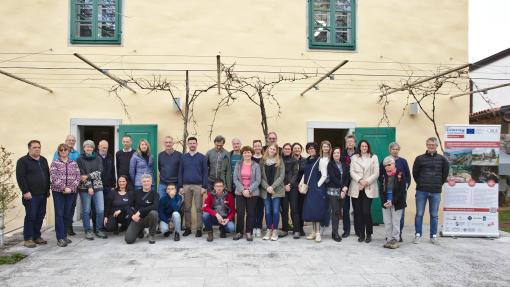As part of the KRAS-CARSO II project, which is co-funded by the European Union under the Interreg VI-A Italy-Slovenia Program, a workshop for speleologists and managers of tourist caves located on both sides of the border of the future Kras-Carso Geopark was held on Monday, March 18, 2024, in the Škocjan Caves Park in Matavun, Slovenia. The event was carried out by the project partner, namely the Slovenian Institute for Nature Conservation (Zavod RS za varstvo narave), in cooperation with the other project partners, Škocjan Caves Park (Park Škocjanske jame), the Karst Research Institute (Inštitut za raziskovanje Krasa ZRC SAZU), and the Autonomous Region of Friuli - Venezia Giulia. The lead partner, ORA Krasa in Brkinov, was also involved and provided the translation service, as the entire event was held in Slovenian and Italian.
The feedback to the workshop, which took place in Matavun in Škocjan Caves Park, was very positive. The meeting was attended by cavers and managers of Divaška, Dimnice, Vilenica, Grofova, Pečinka and Krompirjeva Caves, representatives of Giant Cave (Briškovska jama), Black Cave (Pečina nad Borštom) and Slivia Towers Cave (Pejca v Lascu).
We quickly realized that most of the cavers and operators already knew each other, had already established connections, and shared the same interest in the conservation of caves and the underground living world. Participants first listened to a lecture on Karst and karst phenomena given by Astrid Švara PhD of the Karst Research Institute (Inštitut za raziskovanje Krasa ZRC SAZU), followed by presentations on legislation on cave and biodiversity protection in Slovenia and Friuli - Venezia Giulia. Martina Stupar from the Karst Research Institute (Zavod RS za varstvo narave) presented Slovenia's regulatory protection system, while for Italy, Massimo Zanetti, director of the Geological Service, gave a presentation on legislation at the national, regional, and speleological levels, and Giuliana Renzi, from the Biodiversity Service, presented on the management of Natura 2000 sites.
This was followed by presentations on the management of the two most visited tourist caves in the area of the future Kras - Karst geopark. Borut Peric presented the management of the Škocjan Caves, while Federica Papi, who has extensive experience as a cave guide, gave an example of management of the Grotta Gigante on the Italian side. Learning the basics of the cave protection system, which are based on similar legal foundations in both countries, was very informative for all participants, including representatives of institutions. Despite the different legal bases and the issue of cave ownership, which is state-owned in Slovenia and private in the FVG Region, these were not an obstacle to the development of common management guidelines. Analysis of data provided by individual cave managers revealed certain trends, typical of both Italian and Slovenian caves. These data provided a starting point for discussion and helped to develop common guidelines for cave management, cave tour management, and partnership in the future Kras-Carso geopark.In the afternoon, most participants took part in a tour of Škocjan Caves, led by Dr. Rosana Cerkvenik. The goal was to present practical examples of cave infrastructure management, rehabilitation and reclamation of cave use, and renaturalization of the underground environment. With its patriomonio of knowledge and experience in this field, Škocjan Caves is undoubtedly one of the world's leading caves.
Feedback from participants during and after the workshop was very positive. Full support for the partnership in the future Kras-Karst geopark was also demonstrated. Professional services and tourist cave operators shared a common interest and motivation for long-term sustainable management of tourist caves based on high standards, making the guidelines developed an excellent starting point for the future. Encouraging cross-border cooperation among cave professionals and operators will continue to be part of the KRAS-CARSO II project activities.

